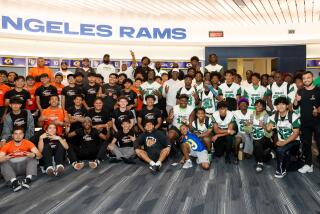Prep Athletes Get Some Help From Carl Eller
- Share via
MINNEAPOLIS — Each Tuesday after classes at Minneapolis Washburn High School, baseball player Mark Allardyce meets with other prep athletes to rap about their future.
They talk about last week’s game, this week’s practice, and next year’s classes. The conversation then turns to more serious subjects such as career plans, coping with the pressures of being star athletes and drugs.
“It’s an unpressurized group, you can relax and talk openly,” Allardyce said.
Overseeing the 20 high school athletes is Carl Eller, the five-time All-Pro defensive end for the Minnesota Vikings who is now tackling a new opponent.
“I handle the human side,” he says.
Eller is handling athletes’ careers. Not as an agent, dealing with big contracts, but as a guide, helping high school, college and pro athletes prepare for life once their playing days are over.
“He wants us to think about more than just sports, to be well-rounded,” Allardyce said.
The 17-year-old junior, who plays baseball, football and basketball, is president of Washburn’s local chapter of U.S. Athletes Assn., a support group founded by Eller who tries to “give them a realistic approach to life.”
Eller introduced USAA to high school coaches at a national convention last June. So far, it has been implemented at high schools in Ohio, North Carolina and on the West Coast.
He has the same message for pro athletes in his “Game Plan II” which he initiated this season with the Vikings.
Every Saturday, Eller would meet with the players to discuss basic career strategies such as writing resumes, job interviews and deciding which route to take once their football career was over.
“That was about the only good thing that came out of last season,” said linebacker Matt Blair. The Vikings suffered through a 3-13 season under rookie coach Les Steckel, who was fired at the end of the year.
“I’ve worked before and had jobs so I know what it takes,” said Viking punter Greg Coleman who talks with Eller at least once a week about potential jobs.
“The football name can get you in the door but after the smoke clears, you’ve got to prove you can do the job,” Coleman said. “A lot of people like to be associated with pro athletes. Then when you say ‘give me a job,’ they look at you differently. For most people, all they know about (pro football) athletes is what they see on Sundays.”
Eller knows much more is involved. Now a consultant to the NFL on alcohol and drug abuse, he is credited with starting the chemical dependency awareness and training program used by the league’s 28 teams.
One of the Vikings’ famed “Purple People Eaters,” Eller can speak from first-hand experience, having undergone treatment for alcoholism and drug abuse.
All the glamour of being a pro athlete was quickly tarnished by his chemical dependency -- which is why he’s so adamant about keeping young athletes like Allardyce and his Washburn teammates drug free and career oriented.
“The challenge is to get everybody to treat athletes like everybody else,” Eller said. “Most colleges prepare the athletes to play football but the colleges are not living up to their responsibility.
“They don’t have any position for a defensive linebacker at Control Data. They can’t hire a defensive linebacker to be an accountant.”
Eller acts as liaison between companies and pro athletes, convincing the corporation that a jock can do the job. At the same time, he has to make the athlete believe he can do it.
Coleman is waiting to hear about two possible jobs with Minneapolis television stations, one set up by Eller. At 30, Coleman knows his playing days are numbered. He also knows his chances at a white collar job, rather than white jersey, are few.
“Why hire a guy 32 years old when you can hire some young whipper-snapper and work with him?” Coleman said.
Eller wants the young athletes to be prepared for the shock and realize sports won’t be around forever.
Allardyce recognizes the commitment. A junior, he sat out last season as a quarterback-wide receiver on the Washburn football team to concentrate on his grades. His best sport is baseball and he has a scholarship from the University of Minnesota.
“This program should definitely be in colleges and high school,” Coleman said. “Once a sport uses a guy up, what’s he going to do later?”
More to Read
Go beyond the scoreboard
Get the latest on L.A.'s teams in the daily Sports Report newsletter.
You may occasionally receive promotional content from the Los Angeles Times.










